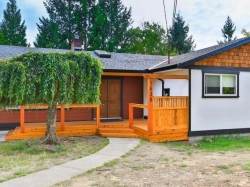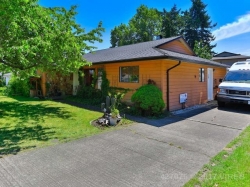Buying a Home: What Can You Afford?
Buying a Home: What Can You Afford?
If you're thinking about buying a home, a question that will undoubtedly weigh heavily on your mind is: "How much can I afford?"
Obviously, real estate affordability will play a major part in your decision making process. You want to be able to buy something you like, but you don't want to feel stretched to the limit when it comes to meeting your financial obligations. Once you discover exactly what you can afford, you can be more realistic in your expectations.
If you're like most people, you lack the funds to make a purchase without seeking substantial help from a lending institution. In addition to coming up with a down payment, you'll have to arrange a mortgage.
Basically, there are two types of costs involved in buying a home:
- The amount of money you'll need for the initial purchase -- consisting of the down payment plus additional costs such as legal fees, inspection fees and taxes; and
- The ongoing costs of paying back your mortgage, along with monthly operating costs for utilities, maintenance, insurance and annual property taxes.
Lenders use several factors in judging your ability to handle a mortgage, including your income, employment record and credit worthiness. However, one way you can estimate the price range you can afford is to look at the amount of money you have available for a down payment.
The most common type of mortgage is a "conventional mortgage." Under this type of mortgage, lenders will loan up to 75 percent of the appraised value of the property or purchase price, whichever is lower.
The remaining 25 percent or more is the amount you will contribute as a down payment. So, if you plan to buy a home that has an appraised value of $100,000, a lender may loan you 75 per cent or $75,000 on a conventional mortgage when you contribute a down payment of $25,000.
MULTIPLY BY FOUR
If you plan to borrow funds through a conventional mortgage, simply multiply your down payment funds by four, to get an idea of the highest priced home you could buy. Then you will have to determine whether you have sufficient income to make the payments on your mortgage. Most lenders won't let you take on debt that you can't service. That's why they'll "qualify" you first, before agreeing to give you a mortgage.
HIGH-RATIO MORTGAGE
If you don't have a 25 per cent down payment, you may want to investigate a high-ratio mortgage.
This type of mortgage is available for up to 95 per cent of a home's appraised value or purchase price, whichever is lower, up to a maximum amount set by the government.
Since you are borrowing more than 75 per cent, the government insists that the mortgage be insured against default and that you pay the cost of the insurance. That cost can range from one to three per cent of the mortgage amount, and is added to the mortgage principal.
LENDERS' CONSIDERATIONS
To determine your eligibility, lenders will look at your monthly housing expenses. These include such items as mortgage payments, property taxes, and utility costs. These shouldn't exceed approximately 30 percent of your monthly gross family income. This is called your "Gross Debt Service" ratio or GDS. (Some lenders will, in fact, go as high as 35 per cent, depending on a number of variables.)
Lenders also use a second calculation in qualifying you for a mortgage. It's called the "Total Debt Service" ratio or TDS. Generally speaking, no more than 40 percent of your gross family income may be used to cover mortgage payments, property taxes, utility costs, plus other fixed monthly payments. These other fixed costs are your ongoing commitments and can include auto, student or personal loans as well as charge accounts.
Lenders will look at both your GDS and TDS amounts in calculating the size of the loan they will grant you for the home you wish to purchase.
Once they've determined the amount of your monthly income available for mortgage payments, they'll calculate the mortgage amount you can have. This is based on current interest rates charged by lenders.
TRY LIVING ON YOUR NEW BUDGET FIRST
Once you've calculated these factors, it's a good idea to try living for a couple of months as if you were paying a mortgage, along with your other living expenses, to see just how well you manage. After all, it may be feasible on paper, but you may not be comfortable with this amount of your income being allocated towards a mortgage. Better to find out now, before you actually make a purchase.
You may readjust your spending habits in other areas for a while. However, if you're comfortable with this test run, then it's time to start looking for your new home.
Local REALTORS, who are members of the Vancouver Island Real Estate Board (VIREB) subscribe to a strict Code of Ethics and high Standards of Business Practice.
This article was prepared on behalf of the REALTORS of VIREB for the information and benefit of consumers.
January, 1993?rev Feb/95?rev Jan/98
Click here For mortgage affordability calculator
READ MORE ARTICLES FROM THE VANCOUVER ISLAND REAL ESTATE BOARD







